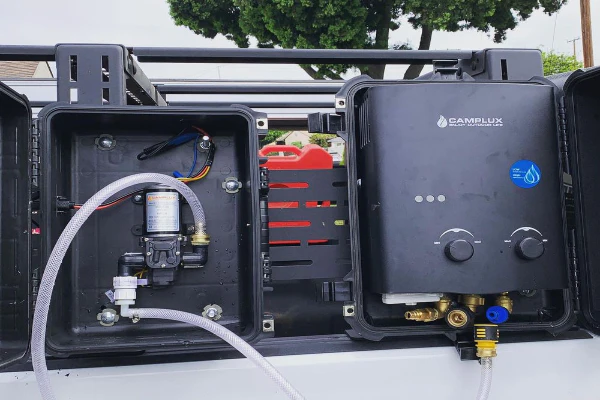Hot water is an essential part of daily life, whether for showering, cooking, or cleaning. When choosing a water heating solution, energy efficiency, cost savings, and environmental impact are important factors to consider. A propane water heater is an excellent option that balances performance and sustainability, making it ideal for homes, RVs, and outdoor setups.
If you’re looking for a reliable and energy-efficient way to heat water, a propane water heater is worth considering. These heaters provide instant hot water while reducing energy costs and environmental impact compared to traditional electric models.
1. How a Propane Water Heater Works
A propane water heater uses liquefied petroleum gas (LPG) as a fuel source to heat water efficiently. The system consists of a burner, heat exchanger, and thermostat, which work together to provide hot water on demand. Unlike electric models, propane heaters do not require a connection to the power grid, making them an excellent choice for off-grid homes, cabins, and RVs.
1.1 Tank vs. Tankless Propane Water Heaters
Propane water heaters come in two main types:
- Tank Water Heaters: These units store heated water in a tank, keeping it warm and ready for use at all times. They are ideal for households that require a steady supply of hot water.
- Tankless Water Heaters: Also known as on-demand heaters, these models heat water only when needed, reducing energy waste and lowering utility costs.
2. Advantages of Using a Propane Water Heater
2.1 Energy Efficiency
Propane water heaters are highly efficient compared to traditional electric models. They heat water faster and require less energy, leading to lower utility bills. Tankless propane heaters, in particular, can achieve efficiency rates of over 90%, meaning more of the fuel is converted into usable heat.
2.2 Eco-Friendly Option
Propane is a cleaner-burning fuel than coal or oil, producing lower carbon emissions and reducing environmental impact. Unlike electric heaters that rely on fossil-fuel-powered grids, propane heaters offer a more sustainable heating solution.
2.3 Cost Savings
Propane is often more affordable than electricity, leading to long-term savings on energy costs. Additionally, because propane heaters heat water faster, they consume less fuel, further reducing expenses.
2.4 Reliable and Off-Grid Compatible
For homes in remote areas or places with frequent power outages, a propane water heater provides uninterrupted hot water without relying on the electrical grid. This makes it a great option for cabins, RVs, and off-grid living.
2.5 Fast Heating and High Recovery Rate
Propane heaters warm water quickly and offer a high recovery rate, meaning they can provide more hot water in a shorter time. This is particularly useful for large households or businesses that require a steady hot water supply.
3. Key Features to Look for in a Propane Water Heater
When choosing a propane water heater, consider these important features:
3.1 BTU Rating
British Thermal Units (BTUs) measure the heating power of a propane water heater. A higher BTU rating means faster heating and greater efficiency. For large households, look for models with at least 50,000 BTUs or more.
3.2 Tank Size or Flow Rate
For tank models, choose a capacity that meets your household needs (e.g., 40–80 gallons for families). For tankless models, check the flow rate (GPM) to ensure it can handle your peak hot water demand.
3.3 Safety Features
A good propane water heater should include:
- Flame failure protection to shut off gas supply if the flame goes out.
- Overheat protection to prevent excessive temperatures.
- Anti-freeze function for winter use in cold climates.
3.4 Energy Efficiency Rating
Look for models with high energy efficiency ratings to maximize savings. Many propane heaters are Energy Star certified, ensuring they meet strict efficiency standards.
4. Installation and Maintenance Tips
4.1 Installation Considerations
- Ensure proper ventilation to safely expel gas fumes.
- Position the heater in a well-ventilated area, such as a utility room, basement, or outside for tankless models.
- If installing outdoors, use weatherproof enclosures to protect against elements.
- Always follow the manufacturer’s installation guide or hire a professional plumber for safe setup.
4.2 Routine Maintenance for Longevity
Regular maintenance helps keep your propane water heater functioning efficiently:
- Flush the system every 6–12 months to remove sediment buildup.
- Check gas connections for leaks using a soap and water test.
- Inspect the burner and heat exchanger for signs of wear.
- Clean air intake vents to prevent blockages and maintain efficiency.
5. Best Applications for a Propane Water Heater
5.1 Residential Homes
A propane water heater is perfect for homes looking for an energy-efficient and reliable hot water source. Whether for daily showers, dishwashing, or laundry, propane heaters provide consistent heating performance.
5.2 RVs and Motorhomes
For travelers and campers, propane water heaters ensure hot water on the go without relying on campground hookups.
5.3 Off-Grid Living
In remote locations where electricity is limited, propane heaters provide a dependable way to access hot water without a power grid connection.
5.4 Outdoor and Commercial Use
Businesses such as restaurants, hotels, and farms benefit from propane water heaters for their high recovery rates and efficiency. Outdoor showers, pool heating, and camping setups also work well with propane models.
Conclusion
A propane water heater is a smart investment for those seeking an energy-efficient, cost-effective, and eco-friendly hot water solution. Whether for home use, RV travel, or off-grid living, propane heaters offer fast heating, reliability, and long-term savings. By choosing the right model and performing regular maintenance, you can enjoy consistent hot water and reduced energy costs for years to come.

